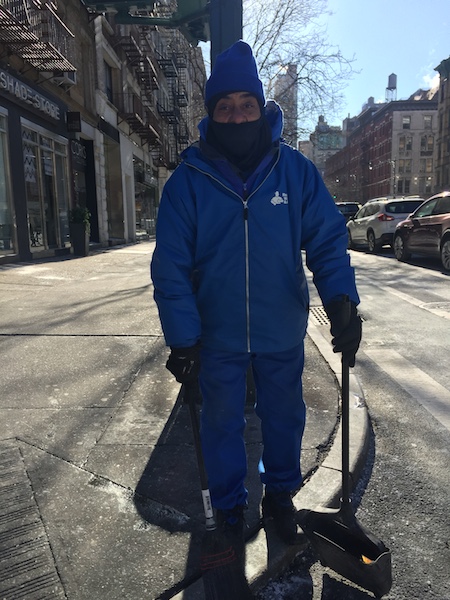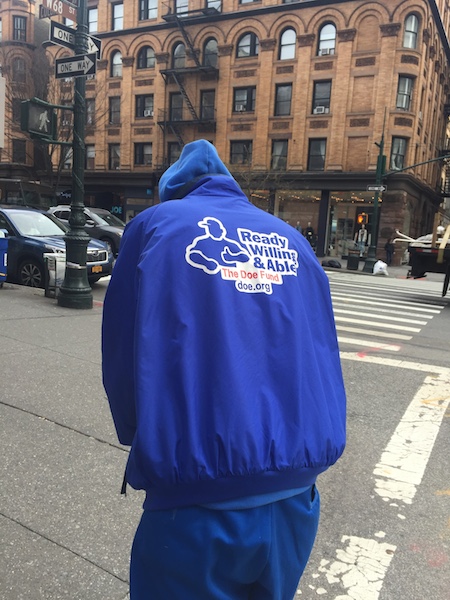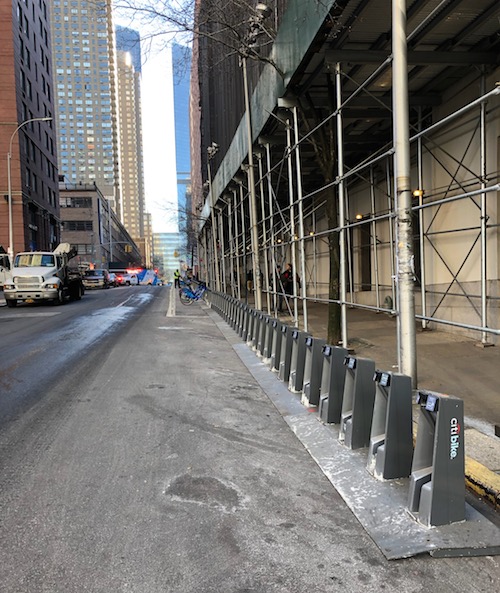By Carol Tannenhauser
New York City streets shaped Cleveland Lawson, then transformed him.
He grew up in the South Bronx, in the 1980s, “with no trees just poverty,” he recalled, in a recent interview with WSR. “I had a code and values and ethics and morals that you learn in the streets. The code of a regular person doing the right thing didn’t exist for me.”
Lawson was 14 years old when he first went to juvenile detention; “juvie,” they call it. “I grew up and lived most of my life in jail,” he said. Now 57, he is a dispatcher at a homeless shelter in Harlem run by a nonprofit organization called The Doe Fund (TDF). Every day, he sends men in bright, blue uniforms into communities throughout the city to sweep sidewalks, change trash bags, and generally make them better. They are “trainees” in TDF’s Ready, Willing & Able (RWA) program, from which Lawson “graduated.” Since January, he has been sending two trainees to clean Columbus Avenue, between 67th and 82nd Streets, under a contract with the Columbus Avenue BID.
But the street-cleaning aspect of RWA is just the tip of the iceberg. What you’re seeing on the streets is an award-winning reentry program for single homeless men and ex-offenders in action. When the men aren’t working, RWA offers an array of services, from intensive case management; to GED, computer and vocational-training classes; to paid “job search” toward the end of the nine to 12-month program, when participants seek and secure permanent employment and, ultimately, housing.

A Doe Fund worker cleaning during the Polar Vortex.
Street cleaning is their entry-level position — their transition to mainstream society, through which they learn the “soft skills” of employment, as straightforward as getting up in the morning, going to work on time, working hard, and doing it all again the next day.
Many of the men in RWA, like Cleveland Lawson, come to one of three Doe Fund facilities straight from prison. In the past, many would have gone back — again and again — but TDF is in the business of transformation. The key ingredients are paid work and personal responsibility. Trainees must remain drug and alcohol free (they are tested), pay rent (in a NYC homeless shelter!) and work, from the day they enter the program. Everybody sweeps the streets during their stay, for which they are paid the minimum wage of $15 an hour. They open bank accounts, save money, pay child support, and produce resumes. “Work Works” has been the motto of the program since it was started nearly 30 years ago by George and Harriet McDonald, who have devoted their lives to providing exceptional opportunities to poor people.
“I heard about RWA in jail,” Lawson said. He was wearing a red uniform denoting staff. In addition to Harlem, TDF has two facilities in Brooklyn, which all together deploy approximately 150 trainees a day, seven days a week, to clean hundreds of miles of city sidewalks and parks.
“They talk about this place in prison like it’s the safest haven, which it is,” Lawson continued. “It’s amazing how they reconstructed my thinking, not just by telling me things, but by the way things are. This is a place where it’s not just said, you can see it.”
“That’s the result of guys wanting to pay it forward,” said Shannon Moriarty, TDF’s director of communications. “More than half of the folks who work in our facilities, who supervise the street-cleaning work, are case managers or mentors in the kitchen, are graduates of the program.”
“They gave me back my life,” Lawson said. “They gave me a chance that nobody else was trying to give me. When I said I couldn’t do something, they pushed me. My supervisor would say, ‘You scared? Get a dog. We don’t do scared. We get this work done.’ So, I said, ‘Let me try.’ It makes you feel good to have responsibilities and be part of a movement that is so positive and powerful.”
Barbara Adler, executive director of the Columbus Avenue BID, brought the “men in blue” back to the UWS after a two-year hiatus. Financial considerations were responsible for their absence. The number of trainees TDF has available to work depends on government funding, paid contracts, foundation grants, and donations from grateful New Yorkers.
“I feel like we have our friends back,” Adler said, smiling. “It’s not just a minimum-wage job for these men. They know they’ve been given a second chance in life and they make the best of it. These guys are really grateful for these jobs. They go way out of their way for various shopkeepers. We had a guy years ago who actually ran after a robber. A woman came out of her shop, yelling, ‘Stop thief!’ He grabbed him and made the news.”
So, how can we get more “men in blue” cleaning the Upper West Side? WSR asked founder George T. McDonald.
“We are thrilled that men of Ready, Willing & Able are back to work on the Upper West Side,” he emailed. “For 30 years, the Men in Blue have maintained the safety and beauty of New York City’s neighborhoods while transforming their lives after long histories of homelessness and incarceration. As the Men in Blue work on the Upper West Side, they are building self-esteem, teamwork skills, and savings to secure independence. We look forward to working closely with local elected officials to continue creating new work opportunities for the Men in Blue on the Upper West Side.”











And who “maintains the safety and beauty” of THEIR neighborhoods???
Yes, it is a WONDERFUL program!
Great article. The Doe Fund is one of the causes Ive supported since residency. It truly does the job its mission states.
Deena Harris MD
Good story! Is RWA program open to women, too? Or is it just for men?
I am deeply moved by this story (so well written) and impressed by the person Cleveland Lawson has become. His transformation through the Doe fund’s RWA program is inspirational!
Just a few weeks ago, I saw for the first time since I’ve lived in the UWS (5 years) while waiting for a bus at 97th and Amsterdam, a RWA man in blue, sweeping up every piece of litter, meticulously and with serious intent. I thanked him, as he passed me, for keeping our sidewalks clean. He smiled and went on his business.
We have been employing Doe Fund workers within the Columbus Avenue Business Improvement District for 18 years, and very proud of it. We are so grateful they were able to come back to us, after their financial situation straightened out. We love the guys who work our route, and so do our merchants.
Thank you, West Side Rag, for publishing this article! What an amazing organization.
Happy to have them back!
Thank you for your hard work, gentlemen.
Great article, fantastic program. These men are working hard and can use all the support they can get.
Great story and good program
This program is truly inspirational. All the best luck to everyone with the program. Thank you, WSR and Carol Tannenhauser, for such a wonderful article.
Great article and welcome back. WE have missed thee guy who do such a great job of taking care of the
UWS. Thank you.
thank you Carol Tannenhauser for this article, and for the interview with Cleveland Lawson.
I am happy to see more coverage in the WSR of all aspects of our neighborhood, including not for profits, the homeless, public housing, and so on. A lot of this is the work of Carol and, more recently, Michael McDowell. these articles have been longer and involve more explanation. “props” to both writers!
the UWS, though changing, includes a lot more than openings and closings of fancy new restaurants. the majority of the people are still middle class, working class, and many are poor. Coverage of their issues and concerns will broaden out the readership of WSR. And maybe we will see more balanced comments… with less overt and covert racial and class bias.
Well,well,well very moving and inspirational story. I am very proud of the ppl that has been reformed by this program. Cleveland keep up the good work!!!
Thank you for sharing the story of the Doe Fund, a tremendous organization. I would encourage anyone who can to make a donation to the fund to help keep it going.
A few times a year I buy a bunch of $20 gift cards to Dunken Donuts, Lenny’s, Starbucks and surprise the guys by gifting them a card with my thanks. They are so overwhelmed by this random act of kindness and appreciation. I welcome any readers of the Rag to join me in taking up this practice. What a great way to celebrate Valentine’s Day!